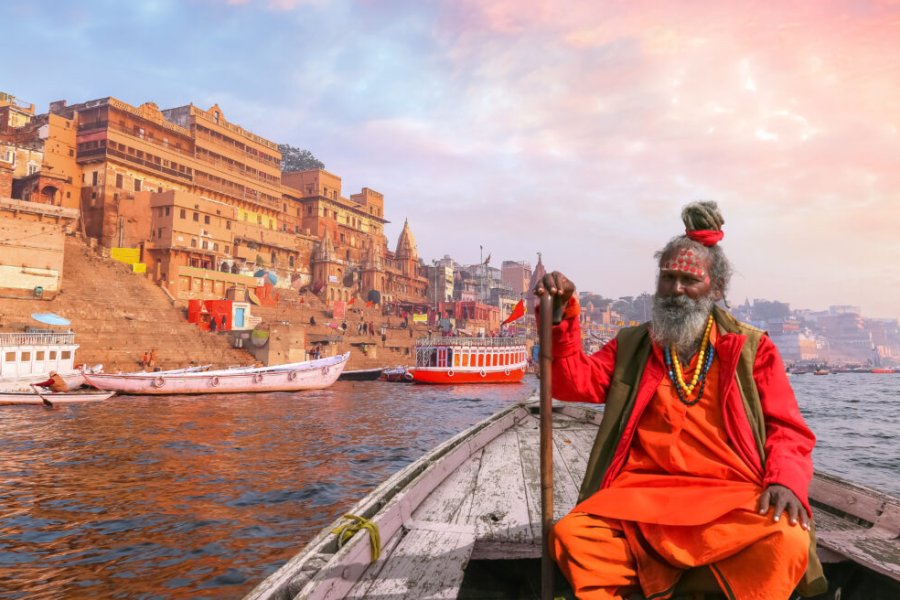Why go to North India? The 10 good reasons to go North India

Enchanting Rajasthan
The land of the Rajputs promises a unique and fascinating experience.

Captivating places of worship
Hindu temples, mosques, Buddhist monasteries, Jain sanctuaries, Sikh gurdwaras...

A pervasive spirituality
Yoga in Rishikesh, meditation in the monasteries of Ladakh, retreats in the Himalayas...

A welcoming population
A tradition in this country, land of cultural mixtures for thousands of years.

Majestic landscapes
From the Himalayan mountains to the Thar desert and the plains of the Ganges

A trekker's paradise
The Himalayan belt offers countless tours through splendid landscapes.

A total change of scenery
A religious, cultural and human kaleidoscope that makes any trip to India unforgettable.

Abundant wildlife
Bengal tigers, elephants, rhinoceroses, monkeys, red pandas, migratory birds...

Hotels unique in the world
Ancient maharaja palaces, charming colonial homes, jungle lodges...

Exceptional gastronomy
Every state and region has its own recipes and tasty specialities.
Good to know to visit North India
 Timetable
Timetable
Temples are generally open from dawn to dusk. Some temples close between noon and 4pm. Museums are mostly open from 9am to 5pm, with one or sometimes two closing days a week. Some places have extended opening hours at weekends and during school vacations.
 To be booked
To be booked
You don't need to book tickets in advance to visit any monuments. However, the Archaeological Survey of India (ASI), in charge of national monuments, has set up an online ticket-buying system, so that you don't have to queue at the entrance to much-visited monuments. You can visit https://asi.payumoney.com to purchase tickets for most monuments. The service costs Rs. 50.
If you're planning a safari in the Ranthambore or Bandhavgarh national parks, it's best to book well in advance (around 3-4 months), especially if you're visiting during the high season (October to March). In this case, please contact your hotel.
 Budget & Tips
Budget & Tips
In India, for visits to paying sites, there are rates for locals (quite low) and rates for foreigners, so don't be offended (even if the price variations are sometimes exorbitant! If that's the case, you may as well move on...).
Discounts for children. For many sites, including national parks, monuments and certain museums, admission is half-price for children under 13. Admission is often free for children under 6.
 Main events
Main events
The Hindu calendar is punctuated with colorful festivals and celebrations, some of which are worth the trip alone. In almost every town and village in the country, one can witness the religious rituals performed during the ceremonies, marked by an incomparable fervor. A fascinating experience that appeals to all the senses. Most of the temples are open to foreign visitors, but the entrance to the sanctuary where the deity is located is often reserved for Hindus only. The entrance to some temples is completely forbidden to non-Hindus.
 Guided tours
Guided tours
Guided tours are mandatory in the National Parks, where the presence of a guide is essential. Some museums offer guided tours, usually in English. The rest of the time, you can visit the cities or sites at your leisure, but the explanations of a qualified guide will often help you understand the culture and subtleties of a place (temple, city, museum or monument).
You will find accredited guides at the entrance of national sites and monuments managed by the ASI. If you want a French-speaking guide, it is best to book his services through the local tourist office. You will also find the contact details of French-speaking guides in our pages, likely to make you visit their city or Rajasthan. Private monuments such as the palaces of maharajas offer for the most part audio guides available in French.
 Smokers
Smokers
Smoking is banned in the vicinity of schools and public buildings, and in enclosed public places (hotels, restaurants, cinemas, etc.). As part of its fight against pollution, the city of Delhi has banned smoking in the streets and in the vicinity of hotels. If you're a smoker, you'll have to go into hiding to light up in Delhi.
 Tourist traps
Tourist traps
If you want to take a guided tour of a monument, check that the guide is accredited. Some sites refuse access to non-accredited guides, so you'll have paid for nothing. For day tours and excursions, always use a reputable agency. If you are approached on the street, there's a good chance you won't be able to keep your appointment, or your vehicle will look like a rolling tomb.
Many agencies pass themselves off as official tourist offices and display the "Incredible India!" logo on their shop windows. Here too, beware. Generally speaking, few tourist offices offer interesting information (unfortunately), so it's best to avoid them.
In some Hindu temples and sacred cities, priests invite people to entrust them with large sums of cash, specifying that the money will go to those most in need. Be aware that this is a scam, and that many of these temple servants have built their wealth on the money of the poor.
 What's very local
What's very local
Make sure your shoes are easy to take off and put back on, as you'll need to remove them for any visit to a temple or mosque. Ladies, always carry a scarf to cover your head or shoulders when visiting religious sites. In general, a covering outfit is always appreciated. Gentlemen, shorts and Bermuda shorts are not permitted in mosques. You must cover your head with a headscarf to enter a gurdwara, a Sikh temple.
Each temple in each town or village celebrates its own festivities. It's a good idea to ask the locals where the nearest festival is, as these special moments are often among the highlights of a trip to India. The religious nature of these celebrations in no way detracts from their festive nature, as merriment is generally the order of the day rather than solemnity, and curious onlookers are more than welcome!



















